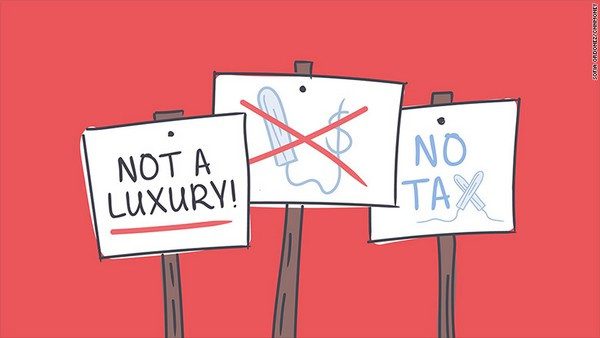Brand Matters
Nigeria Should Eliminate Tampon Tax On Period Hygiene Products -By Isa Salisu
Government should consider given free sanitary pads, government provide free-fair election every four years, why women who must menstruate every month doesn’t have that fairness in distribution of free sanitary pads?

Kenya, Uganda, Zambia, Botswana, Namibia and South Africa are the only African nations that eliminate the “tampon tax,” Nigeria, often referred to as the “Giant of Africa,” fails to, or even propose the removal of tax on menstrual hygiene products. From period poverty, to stigma, to menstrual inequity, to the fact that, girls had missed school due to lack of access to period products. Also, the myth that Periods Are a ‘Woman’s Issue and other myths painted to menstruation contributed to the problem here.
The average person who menstruates spends about $1,773 on period products in their lifetime while the increase in prices coutinue to mount up, and which affect almost every sector here in Nigeria, is very unfortunate to say young girls who can’t afford the menstrual hygiene products in their period had dream-killer because they never get to attend schools during menstruation. Whilst others go for menstrual hygiene products alternatives that comes with health insecure it’s totally unhygienic practice. From bad to worse some might be sexually abused in their pursuit to look for money to buy menstrual pads.
According to UNESCO, 1 out of 10 girls in Africa miss school during their menstrual period and eventually drop out. This has a negative effect on the education of women and girls. What would you do if you missed 20% of your school year because you did not have access to menstrual hygiene products? This is the reality for many people who menstruate across Africa. It’s estimated that in Sub-Saharan Africa, 1 in 10 girls miss school due to period poverty which is caused by a number of factors including inadequate drinking water and sanitation crucial for women and girls to manage their period.
Menstrual hygiene is a fundamental issue that impacts human rights, dignity, and public health. To reduce the burden, Nigerian government and relevant stakeholders needs to embrace the elimination of “tampon tax,” and start the distributing of free sanitary pads to vulnerable young girls who cannot afford to buy it every month.They don’t have any choice they must menstruate. They need this, subsidy? let’s brings back smiles to them, let’s keep their respective dreams alive.
To achieve a world free of period poverty, menstrual health must be seen as a human rights issue, not just a woman’s issue. The nation’s parliamentary setting need time to support this action which aim is ending period poverty to transform the health and wellbeing of adolescent girls in Nigeria. Awareness should be created and dispatched to all rural areas including education on cultural beliefs and restrictions during menstruation, menstrual hygiene. Non-government organizations should also come forward to educate rural settings.
Government should consider given free sanitary pads, government provide free-fair election every four years, why women who must menstruate every month doesn’t have that fairness in distribution of free sanitary pads?



















